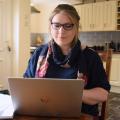
Almost a third of people are worried about connecting with others as they did before the pandemic, a study has revealed.
The concerning data comes following a poll carried out by the British Red Cross, made up of 2,000 adults in the UK.

It found that 32pc of people were concerned about post-covid life and over a third (35pc) admitted feeling less connected to their community, while even more (39pc) believed their feelings of loneliness would stay once restrictions lifted.
Now, MPs and peers are urging for much-needed action to tackle the country’s “loneliness emergency”.
A cross-party, all-party parliamentary group on loneliness, chaired by Conservative MP Neil O’Brien, wants the government to ensure that the country has a “connected recovery” which would include looking at issues such as the digital divide and more funding for charities that help “the lonely and cut-off”.
One group, which is especially vulnerable in Norfolk, Waveney, and north Suffolk, is the older generation.
Kelly Lindsay, the founder of the charity Friend in Deed, explained that there is only so much that the government and local councils can do in order to help tackle loneliness, especially for older people.
The Norfolk-based charity creates friendship across generations through various intergenerational schemes, to reduce loneliness and promote kindness.

Miss Lindsay believes communities will “bounce back quicker” from the effects of Covid-19 if everyone plays a role in being kinder, offering more support, and forming connections with one another.
She said: “Pre-covid, we would often discuss levels of disconnect across communities. Why don’t we use the journey out of lockdown measures to create kinder and more inclusive communities by reaching out to each other?
“The pandemic turned our lives upside down, regardless of our age, but I am especially concerned about older people and those living with dementia.
“It is likely that older people feel less connected, less confident, less mobile, and their overall physical and mental health may have been negatively affected by lockdowns.”
Miss Lindsay suggested more outdoor spaces, where people of all ages could feel confident mixing at a safe distance, would benefit older people, as well as posting notes or knocking on their neighbours’ doors to offer support, friendship, and connection – especially if they live alone.
She added: “More than anything, we all need to be kind.”
Echoing the British Red Cross poll, research carried out by Age UK in October 2020 showed many older people were feeling more anxious since the start of the pandemic.
A total of 64pc said they felt less confident taking public transport, while 43pc felt less confident going into shops. Lockdown has also meant many older people have “de-conditioned”, meaning they are unable to do as much as they used to, with 18pc admitting they felt less steady on their feet, and 36pc felt less motivated to do things.
Dan Skipper, chief executive officer of Age UK Norwich, put physical activity and wellbeing support at the front and centre of the Covid recovery.

“Just like all other age groups, many older people have mixed feelings about coming out of lockdown,” he said.
“Most are looking forward to more contact with their loved ones and getting back to social activities and pastimes they enjoy, but others have been severely impacted by the months of lockdown and the government messages about their safety.”
The independent charity, which supports people aged 50-plus, and their families, has extended its Health@Home service, which offers support including one-to-one exercise classes in the home or garden for fitness, strengthening and balance, or companionship to leave the home and get used to getting out again.
It also offers a range of activities including groups for physical activity, wellbeing, and friendship, as well as providing a service to help carers in the community.
-
For more information about Age UK Norwich and its Health@Home service ring 01603 496333 or visit the website www.ageuknorwich.org.uk.
-
For more information about Friend in Deed visit the website www.friendindeed.org.uk or find them on Facebook.



Comments: Our rules
We want our comments to be a lively and valuable part of our community - a place where readers can debate and engage with the most important local issues. The ability to comment on our stories is a privilege, not a right, however, and that privilege may be withdrawn if it is abused or misused.
Please report any comments that break our rules.
Read the rules here